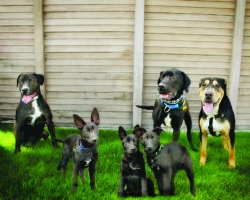I’ve noticed a very strange thing working with rescue operations over the last few years. There are more black dogs in shelters than any other color. Big, small, long-haired or short, it doesn’t really seem to matter. Black dogs typically stay with their rescues for the longest amount of time before being adopted. I needed to find out why. Was there something I was unaware of about black dogs?
My investigation began with a rescue that specializes in black dogs. Yes, that’s correct – it specializes in black dogs. Black Pearl Dogs was started in 2004 by Tamara Delany to make the public more aware of the plight of black dogs.
“When I realized how adoption disadvantaged black-coated dogs were, I made a firm decision to hold a torch for them publicly and Black Pearl Dogs became reality,” Delany said. “I want people to become aware that when they decide to adopt a dog, they shouldn’t just look at what the dog looks like, they should find the best personality match.”
Maggie Thompson, a volunteer at a Los Angeles shelter recalled one big black dog in particular that she helped find a home. Jack was a black Labrador retriever and Thompson had no idea how long it would take to find this pup a home. Jack was a sociable dog in perfect health. His problem was the color of his coat. He bore the stigma of the “BBD” – an acronym shelter workers use to refer to big black dogs, which are frequently passed over for smaller, lighter-colored dogs. Jack, a big, goofy, fun-loving black Lab waited years to find his home.
Alexander Baerg adopted Bella, another black dog. “I had never heard about Black Dog Syndrome before and it makes me very sad,” Baerg said. “Bella was left in the gutter as a baby (four weeks old). She was abused severely, poked with what the vet thought was a screwdriver in her eye, and left for dead. Was it because she was a black dog? I am even more grateful now to have her seeing that the cards were stacked against her more than I knew. Having one eye and being black, she may not have been adopted or even thought of as worth adopting. Someone thought of her as trash but she is truly the treasure of my heart.”
There may be many reasons why black dogs are adopted less frequently than non-black dogs. Superstitions and old folklore place evilness on both black cats and dogs. In stories by Sir Arthur Conan Doyle and Sir Walter Scott, the black dog is creepy, haunts cemeteries and is an omen of death. In the Harry Potter series, there is a big black dog called the Grim, which relentlessly stalks Potter. Winston Churchill battled serious bouts of depression that he called the black dog. In the movies, the color white has tended to depict the hero, while villains wear black. Could it be that such associations have become ingrained in our brains?
Black dogs that appear on the big screen are usually portrayed as aggressive and dangerous characters. In my experience, black dogs are more difficult to photograph. I discovered that this is why they are not used in commercials and advertising campaigns. Regardless of the reason, shelters are trying to get creative with these dogs to stop Black Dog Syndrome.
Holli Griggs, founder of Stella’s Hope, has dedicated the month of April to black dogs. Her goal is to have five of her black pups in new homes by the end of the month. Griggs said, “Although we want all of our dogs to find forever homes, it’s the black dogs that are the ones we have a harder time placing, as people tend to overlook them. It’s sad because they are all wonderful in every way.”
I got to meet all of the black dogs of Stella’s Hope and I can vouch for them all. And yes, the pups in the photo are Stella’s black dogs.
Black Dog (and Cat) Syndrome is a reality. So for anyone considering adopting a dog, remember to take a look at the black pups that line the shelter fences. They are every bit as wonderful as lighter-colored dogs, and make just as loving and faithful companions. Remember, it is personality and compatibility with your family that counts most.













